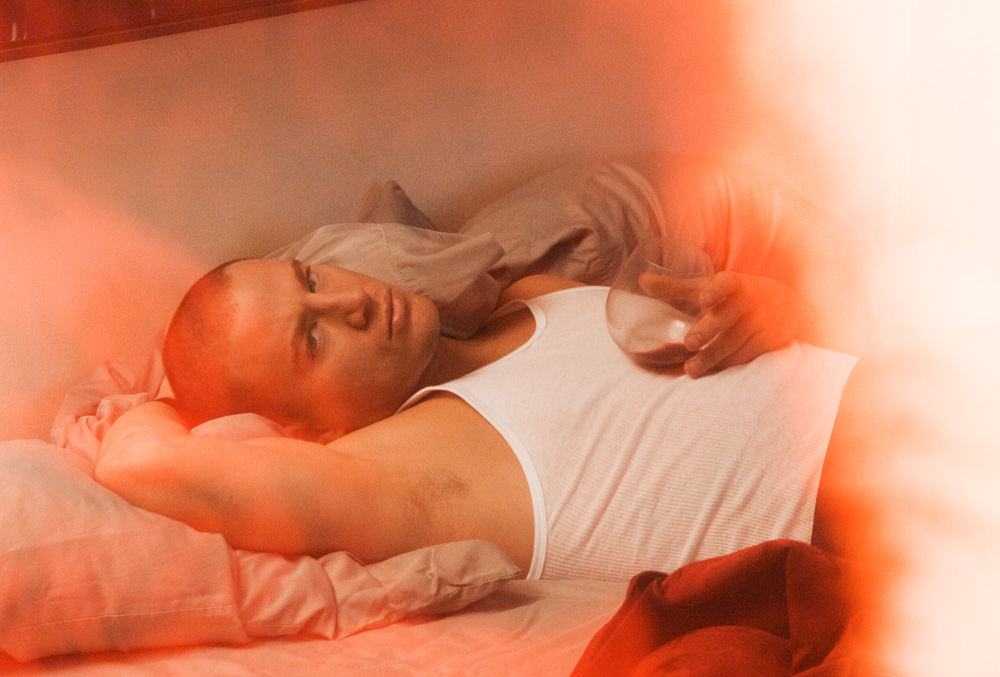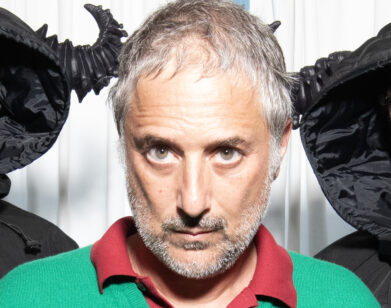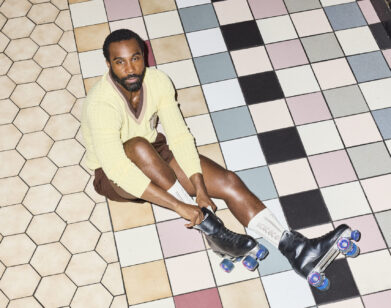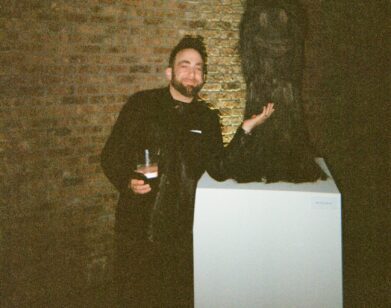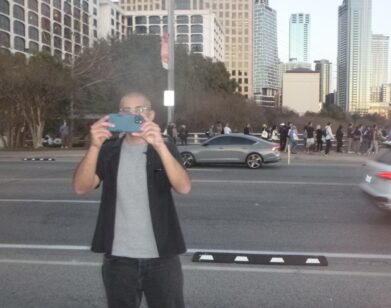Channing Tatum Has a Conversation with Marlon Wayons
The story of Channing Tatum seems to reinforce the validity of the spectacular arc of life in movies. Take, for example, this brief rundown of essential plot points so far: He is born in a small town (Cullman, Alabama); he overcomes his early outsider status to become a popular kid (and even winds up playing football); he gets into hip-hop dancing (after seeing a guy do head spins at a local club); he is discovered on the street (by a modeling agent); he gets cast in a critically acclaimed independent film (A Guide to Recognizing Your Saints, 2006); he lands a part in a big studio film (Step Up, 2006); and he is tapped for unmitigated superstardom (at least a lot of people are betting on it). It doesn’t hurt that Tatum is—and, by all accounts, has always been—very good-looking. But watching him onscreen, it’s clear that his face and his good luck aren’t his most important assets.
In his brief career, Tatum has shown a special aptitude for playing highly physical characters whose actions often articulate more than their words. In A Guide to Recognizing Your Saints, Dito Montiel’s semi-autobiographical film about growing up in Queens in the mid-1980s, Tatum plays the loyal enforcer in a splintering crew of childhood friends, conveying a complex range of emotions—pride, disappointment, anger, love, betrayal—so thoroughly with the pitch of his shoulders, the angle of his brow, and the gait of his walk that you could probably watch the film with the sound off and still understand what’s happening from scene to scene. As a slam-dancing vandal in Step Up, he performs a sort of existential ballet of confusion and conflict. As a soldier who has returned from Iraq in Stop-Loss (2008), he radiates a kind of strength and solidarity with his posture. Now, if you asked Tatum about how he arrived at any of these acting choices, he would probably tell you that he never made them to begin with. He doesn’t seem to think and then do; he just does—which is the way he goes about business in the rest of his life as well.
The next few months are busy ones for the 29-year-old Tatum. He recently reunited with Montiel for Fighting, a film about underground grapplers, and he also plays Pretty Boy Floyd in Michael Mann’s highly anticipated John Dillinger film, Public Enemies, which is headlined by Johnny Depp and Christian Bale. But the Hollywood industrial complex seems to have bet the farm on G.I. Joe: The Rise of Cobra. Tatum plays the indomitable soldier Duke, who—as any fan of the ’80s cartoon series can tell you—is the embodiment of all that is right and good, and the unquestionable star of the show. The film co-stars Dennis Quaid, Joseph Gordon-Levitt, Sienna Miller, Ray Park, Christopher Eccleston, and Tatum’s interviewer here, Marlon Wayans.
———
MARLON WAYANS: So when did you start hip-hop dancing?
CHANNING TATUM: I think when I was around 15. My sister was friends with the manager of a nightclub, and I remember going there to deliver these flyers—her boyfriend did graphic design. So I remember that they got me into this club, and there were these guys in this circle who were flipping and doing all this crazy stuff, and I was just like, “Oh, my god. I want to do that!” I was seeing this guy spin on his head . . .
WAYANS: Can you do head spins?
TATUM: I can get around, like, two or three times, but I’m not graceful at it. I can’t do it like real breakers can.
WAYANS: So how, then, did you get discovered?
TATUM: At one point I just decided, “All right, I’ve got to try to do something with my life.” So I went down to Miami, and somebody saw me on the streets, and that’s how I got into modeling.
WAYANS: So you were just hanging out on the streets of Miami with your shirt off, and someone was like, “Oh, he’s fly. I’m going to make him a model”?
TATUM: Yeah, pretty much.
WAYANS: That would never have happened to me—although I was found in the streets, too. [Tatum laughs] Who did you model for?
TATUM: [pauses] Abercrombie & Fitch . . .
WAYANS: [laughs] I love it! How could you keep that from me?
TATUM: Why do you think I kept it from you?
WAYANS: [laughs] There are certain things you tell people up-front, like, “I’ve got herpes,” or, “I was an Abercrombie model.” So when you were modeling for Abercrombie & Fitch, were you, like, the dude who stands outside the store all greased up, with abs that go all the way down to his perineum?
TATUM: Nah, man. I was actually one of the guys in the catalog. I had to put on a chicken suit at one point. I was like a mascot. We were in a locker room, and there were a bunch of dudes with abs all the way down to their . . . whatever the hell—their perineums? And then I was in the chicken suit standing next to them . . . [Wayans continues to laugh] Stop.
WAYANS: Okay . . . [laughs some more] So what did you do after that? What was the progression?
TATUM: I did some campaigns, and then . . . I don’t know. Modeling was successful for me. I didn’t have to wait tables or anything like that, so that was nice. And I got to see the entire world. Then I auditioned for a Pepsi commercial, and I got it, and that was incredibly fun. So I thought, Well, maybe I should try this acting thing . . .
WAYANS: When we were doing the shooting scenes on G.I. Joe, you were a little bit better versed at using the guns than a lot of the guys. You want to explain that?
TATUM: I’m from Alabama—I like guns.
WAYANS: Did y’all get them for birthday gifts when you were, like, 3 years old? How long have you been shooting?
TATUM: Well, the first and only time I went hunting, I shot a deer, and it mortified me. I just couldn’t do it again. But I know a lot about guns, so I go to the gun range and stuff like that with friends sometimes.
WAYANS: I’ll take you shooting. I’d go sometimes because I had to practice for the film.TATUM: If I’d known you could shoot, then I wouldn’t have pulled that prank on you when we were filming in Prague . . .
WAYANS: I want us to keep our female audience, so I won’t talk about the prank that we played on each other when we were filming G.I. Joe . . . But I do actually have a question for you: How did our first assistant director’s car tire wind up in my dressing room? What happened?
TATUM: You were in your trailer that day. We had to do the snow scene, and we did it with about eight million pounds of salt—like, rock salt. And I kept filling his pockets up with salt when he wasn’t looking, so every time he turned around, he’d have an entire pocketful of salt. Finally, he was so pissed off that he buttoned up his pockets. But even when he unbuttoned them real quick, I’d fill them back up somehow. He didn’t know how I did it. He eventually had a trailer full of salt. So then we decided to fill his car with porn. He left his windows cracked, so we put maybe six or seven books of, like . . . I mean, like, thousands of pages of porn. And then we stole a tire so he couldn’t drive home.
WAYANS: And that was game over. [Tatum laughs] So, on the subject of G.I. Joe, you were the only guy on that movie who actually wanted to do all of his own stunts. At one point, you wanted to run into a burning building. Why would you want to do that?
TATUM: I wanted to be able to tell my grandkids one day, “Hey, your grandpa ran into a burning building and survived.”
WAYANS: The thing is, you won’t have grandkids if you get burnt up in a building . . . I was, like, 50 yards away, and I could feel the gel in my hair
frizzle up. When we make the next G.I. Joe movie, I’ll paint you black—you can do all of my stunts.
TATUM: Only if I can paint you white, so you can do all my comedy . . . But I really like doing action. It’s one of those things where I negotiate the world physically, I think, more than mentally. You could call me a meathead or whatever, but I just do. I enjoy running and jumping.
WAYANS: Well, you are physically gifted. I mean, I’ve seen you do flips and
things . . . You’re like Spider-Man without the costume on. You climbed out my window once, and I was like, “This boy is half monkey.” [Tatum laughs] Have you ever gotten hurt on a film?
TATUM: When we were doing Fighting, I broke my nose and had a concussion. In the middle of the scene, this guy literally pushed my nose back into place with two spoons. He was just like, “Don’t worry about it.” And I was like, “What?” He had a bucket of ice and two metal spoons . . .
WAYANS: You had a good ol’ ghetto doctor. That’s the way my dad used to fix my broken stuff. You also got to do a movie with Michael Mann, PublicEnemies, which I’m extremely jealous about . . .
TATUM: That was absolutely nuts. Essentially, for me, it was kind of like having an extra’s part. I flew in for one day, and it was like the length of a commercial shoot. All I did was run from Christian Bale in an orchard all day—I played Pretty Boy Floyd and Christian’s character kills me. The scene kind of introduces Christian Bale’s character, Purvis, who is, like, the head honcho in the FBI. Johnny Depp is in the film, too.
WAYANS: That’s good company. Did Christian Bale yell at you at all?
TATUM: Nothing that wasn’t either merited or scripted. [laughs]
WAYANS: Well, I hope you do more action movies, but I would love to see you do a comedy.
TATUM: Only if it’s with you. I’m not a comedian.I can play off of people, but I’m not that guy.I don’t want people being like, “Yeah, he should have stuck with drama . . .” It would not be my choice to have critics mumbling that.
WAYANS: Is there any actor whose career really inspires you?
TATUM: Man, there are so many dramatic actors where I would give all of my anything to have their careers, but I don’t think I can try to follow anyone. I mean, if you look at any of the greats, from people like Paul Newman and Robert Redford to, you know, Brad Pitt—to get any of the kinds of roles like the ones that they’ve gotten, or just to be a part of any of the kinds of movies they’ve made, would be the end-all for me.WAYANS: What scares you?
TATUM: Comedy. [laughs]
WAYANS: What’s your favorite place in the world?
TATUM: My family’s ranch in Alabama.
WAYANS: Why?
TATUM: Because I don’t have one bad memory from there. I can sit underneath the shed with all my family, my cousins, and everything, and just be like, “Yeah, this is what it’s about—just sitting with people you love and hanging out.”
WAYANS: You mentioned your sister earlier. Are you guys close?
TATUM: Yeah, really close. She’s like my surrogate mom.
WAYANS: So it’s just you two in the family?
TATUM: That’s it. Me and my sister. She’s older.
WAYANS: Did she make you play with her Barbies and stuff?
TATUM: She probably dressed me up as a Barbie.
WAYANS: Wow. Your sister did that to you, too?
TATUM: Yeah. [laughs] I don’t know, man . . . It might have been a blessing. It’s like my sister said: “How can I give this kid so many issues that he becomes a good actor one day?”
WAYANS: What’s your idea of heaven?
TATUM: Having a huge compound that’s, like, thousands and thousands of acres big, which all of my friends live with me on.
WAYANS: What’s hell?
TATUM: Hell would probably be . . . [pauses] I’ve got some funny things that I could say, but I’m not going to say them. I’m going to plead the Fifth on my idea of hell, because we might get into trouble.
WAYANS: If you did Dancing with the Stars, do you think you would win?
TATUM: I would probably be the first one booted. I can’t do that whole ballroom dancing thing. I don’t even know how to do that.
WAYANS: What are you talking about? You did Step Up, Step Up 2, Step Up 4,000 . . .
TATUM: Did you see any classical dancing in there? Hell, no.
WAYANS: I’ve seen you do a pirouette.
TATUM: Okay, fine, you’ve seen me do a pirouette.
WAYANS: That’s tougher than hip-hop dancing?
TATUM: Yeah, it’s a lot tougher to me . . .
WAYANS: If you could do a biopic, who would you want it be about?
TATUM: Jim Thorpe is someone I’ve always loved. He was an Olympic athlete, you know, and a football player from back in the day. I’d love to play him. And then there’s a guy called Iceman who was a top hit man for the mob. I would love to play him. Actually, it’s sort of in the works, so I hope it goes through. But we’ll see . . .WAYANS: What’s your slogan for life?
TATUM: Good friends and beautiful futures.
WAYANS: You’re a poetic little mother—
TATUM: [laughs] Naw, man . . . I write, but I don’t write poetry. I don’t rhyme or anything like that.
WAYANS: [laughs] So now that you’re on your way to being successful, what do you think success is?
TATUM: My bar for being successful is being able to do movies that really mean something to me and being able to make a living off of that. Playing a character that allows me to play around with some of the feelings I have inside of myself and explore them—and maybe put them to rest a little bit, or at least come to terms with them—feels successful to me. I think it’s about believing in what you do.
WAYANS: So, last question: Has there been anybody who just didn’t believe you’d amount to anything or who was such an obstacle in your life who you’d like to say something to now?
TATUM: Probably everyone in my high school who was a senior when I was a sophomore. They would just pick on me to no end. So to them, I’d like to say, “How do you like me now,
bitches?”â?¯
Marlon Wayans is an actor, screenwriter, and producer.
Want to get ripped like Channing Tatum? Try this workout here.

